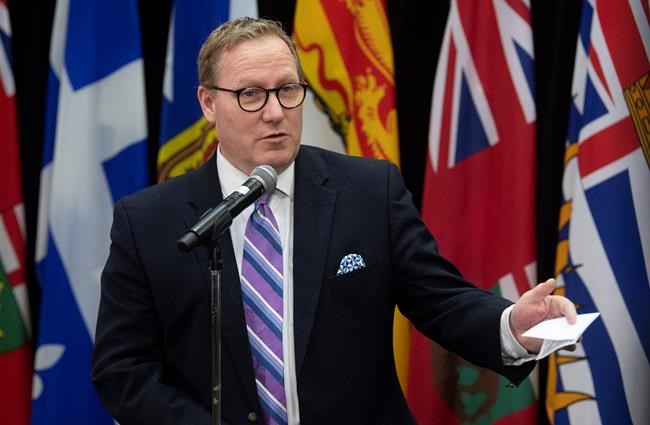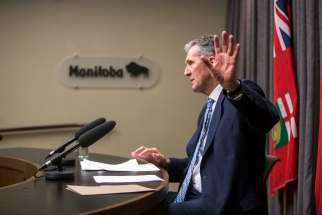Hitting equalization jackpot nothing to crow about, but premier’s complaints ring hollow
Read this article for free:
or
Already have an account? Log in here »
To continue reading, please subscribe:
Monthly Digital Subscription
$0 for the first 4 weeks*
- Enjoy unlimited reading on winnipegfreepress.com
- Read the E-Edition, our digital replica newspaper
- Access News Break, our award-winning app
- Play interactive puzzles
*No charge for 4 weeks then price increases to the regular rate of $19.00 plus GST every four weeks. Offer available to new and qualified returning subscribers only. Cancel any time.
Monthly Digital Subscription
$4.75/week*
- Enjoy unlimited reading on winnipegfreepress.com
- Read the E-Edition, our digital replica newspaper
- Access News Break, our award-winning app
- Play interactive puzzles
*Billed as $19 plus GST every four weeks. Cancel any time.
To continue reading, please subscribe:
Add Free Press access to your Brandon Sun subscription for only an additional
$1 for the first 4 weeks*
*Your next subscription payment will increase by $1.00 and you will be charged $16.99 plus GST for four weeks. After four weeks, your payment will increase to $23.99 plus GST every four weeks.
Read unlimited articles for free today:
or
Already have an account? Log in here »
Hey there, time traveller!
This article was published 17/12/2019 (2184 days ago), so information in it may no longer be current.
Manitoba Finance Minister Scott Fielding shouldn’t have too much to complain about after meeting with Canada’s finance ministers Tuesday.
Manitoba is about to get one of the biggest boosts in equalization payments from Ottawa in recent memory — a staggering $255 million increase in 2020-21. That’s an 11.3 per cent hike, according to new figures released by Finance Canada. It’s higher than the 10.7 per cent increase Manitoba received last year.
Manitoba sees big jump in equalization

Posted:
WINNIPEG - The Manitoba government's battle to cut the deficit is getting another round of help from federal transfer payments.
It’s a jackpot. And it will go a long way towards helping the province balance its books, expected in 2022.
For Premier Brian Pallister’s government, it’s been an unexpected boon. Equalization was largely flat during the last few years of the former NDP government. From 2011-12 to 2015-16 (the NDP’s final year in office) equalization grew by only 4.3 per cent, from $1.666 billion to $1.738 billion.
Equalization was flat in the Tories’ first year in office. But payments began climbing rapidly after that. In 2018-19, the federal payout jumped $217 million to more than $2 billion, or 11.9 per cent. All told, the Pallister government is receiving $774 million more in equalization annually — a 45 per cent increase — than it did when it took office in 2016.
That’s big money when you consider the province’s core spending is estimated at $14.2-billion this year. The increase alone in equalization over the past five years represents 5.5 per cent of the province’s core spending (not including outside agencies, such as Crown corporations).
While the province is happy to take the money, it undermines the Tories’ political position that they’re getting short-changed by the federal government. All provinces want larger transfers from Ottawa, especially when it comes to health-care funding. While there’s a credible argument to be made that Ottawa’s share of heath-care funding has declined in recent years, have-not provinces like Manitoba that receive large equalization payouts have little to complain about.

Manitoba is subject to the same Canada Health Transfer increases as all other provinces, which is paid out on a per capita basis. What really matters is the total payout from Ottawa, which includes equalization, the CHT and the Canada Social Transfer (funding for social programs and post-secondary education).
When you add up all three, Manitoba gets one of the richest per capita payouts in the country, even higher than Quebec. Only New Brunswick, Nova Scotia and Prince Edward Island get higher per capita transfers than Manitoba.
So when Pallister whines about not getting enough federal dollars to pay for health care (equalization can be spent on whatever a province wants), it’s tough to take his protests seriously.
Getting large equalization payouts is not something Manitobans should be happy about. The reason for the massive increases is because Manitoba isn’t doing as well economically as other provinces. Equalization is paid out to less-prosperous provinces based on their fiscal capacity. The main reason Manitoba’s equalization payments were flat prior to 2016 was because — for the first time in history — Ontario began drawing payments. That resulted in less money for other provinces. But as Ontario’s economy improved relative to others, its equalization payments dropped off. It fell to zero this year. As a result, more equalization dollars were available to other provinces again, including Manitoba.

The reason Manitoba’s equalization payments are going up as much as they are in 2020-21 is because Quebec’s economy has improved, relative to other provinces. Quebec is still getting large equalization payouts. But it’s only getting a one per cent increase next year, leaving more money on the table for other provinces.
The total equalization pie is expected to grow by $736 million in 2020-21. Manitoba will gobble up about 35 per cent of that.
None of this bodes well for Pallister’s claim that Manitoba is “the most improved province” in Canada. Manitobans will have “more money on the kitchen table” next year. But that’s thanks, in large part, to improved wealth in other parts of the country.
tom.brodbeck@freepress.mb.ca

Tom has been covering Manitoba politics since the early 1990s and joined the Winnipeg Free Press news team in 2019.
Our newsroom depends on a growing audience of readers to power our journalism. If you are not a paid reader, please consider becoming a subscriber.
Our newsroom depends on its audience of readers to power our journalism. Thank you for your support.
History
Updated on Tuesday, December 17, 2019 7:32 PM CST: Updates









